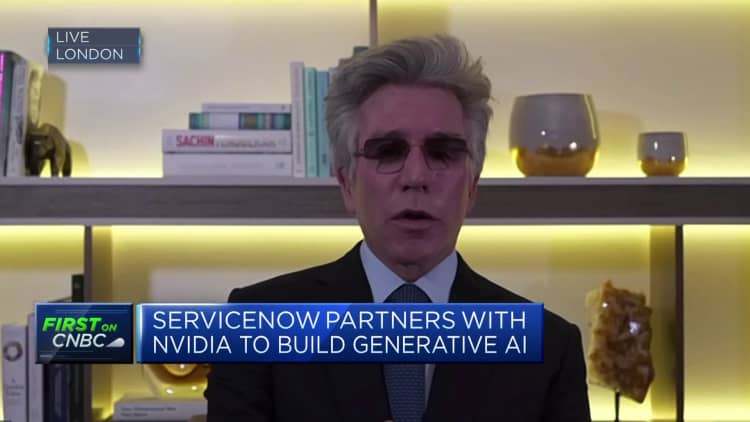Leveraging artificial intelligence used to be a heavy lift. Engineers were involved and companies needed to find a huge enterprise-wide reason for it.
Not anymore. Narrow use cases for AI have given way to a proliferation of the technology, said Sequoia Capital partner Konstantine Buhler, a speaker at a CNBC Technology Executive Council dinner earlier this month in San Francisco.
Buhler says the biggest difference he sees in the AI landscape today is the accessibility of the technology. "To me, if AI is parallel to the personal computer, then large language models are parallel to the graphical user interface," he said in a follow up interview with CNBC. LLMs, he adds, didn't change "everything under the hood, they changed the interface and the way people can interact with AI."
That difference is influencing the kinds of startups that interest Buhler. With almost any company able to integrate AI into any application, he invests in startups that use AI as real leverage. "I want to be able to see if these companies are getting more out of it, or is it just peripheral to the business," he said.
Buhler likens it to the change brought about when personal computers became mainstream. "If you were a typist back when PCs started hitting the market then your job changed a lot," he said. "If you were running a laundromat, your job changed a little. Which one do you want to fund? You want to fund the one that's going to see the biggest transformation because of AI."
That thinking goes beyond venture capitalists and into the enterprise. In the most recent CNBC Technology Executive Council survey, nearly half of the companies (47%) said that AI is their top priority for tech spending over the next year. In fact, AI budgets are more than double those of cloud computing, the second-biggest spending area at 21%.
Nearly two-thirds of the respondents said their AI investments are accelerating, yet they also acknowledge that they represent a bigger slice of a smaller pie. A little over half of tech executives (53%) said the rise in interest rates has caused them to slow overall spending.
Industries most impacted by AI
Buhler believes that generative AI will have the biggest impact on companies — and jobs — that involve a lot of writing and content generation, including media, the law, consulting and marketing.
Yet he's quick to point out that the disruption will result in the birth of different jobs. "All this doomsday, end of mankind stuff out there, I don't buy that one bit," he said. "I didn't come up with this quote, but I believe it, 'AI is not going to replace you. Someone using AI is going to replace you.'"
That thought is echoed in the TEC survey, with 47% of respondents saying they think AI technologies will create more jobs than they destroy. But another 26% said it will destroy more jobs than it creates, and an equal 26% said it's too soon to know.
"We always underestimate the social impact of any new technology," said Diogo Rau, chief information and digital officer at Eli Lilly. "Can you think of a technology that didn't change how people interact with each other? From the car to the radio to the internet to the phone, what really changed was social interaction."
Like Buhler, Rau worries more about companies that shy away from AI based on fears over employee use or privacy — concerns that Buhler said can be addressed with proper guardrails.
"What I'm excited about is what machines can come up with that no human might have imagined, such as new molecules for medicines," said Rau, who is a member of the CNBC TEC. "Maybe I need to start a fund that shorts companies that ban ChatGPT use and go long on ones that encourage it."







